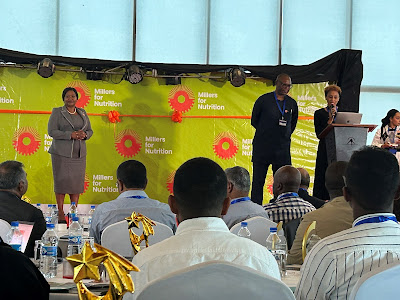Nam Dinh, Vietnam, August 20, 2024 - To promote the use of organic fertilizer and the mainstreaming of rice straw-based circular economy model, the International Rice Research Institute (IRRI) partnered with the Department of Crop Production and Plant Protection of Nam Dinh province to organize a training workshop and field demonstration on mechanized rice straw-based composting.
Pages
Wednesday, August 28, 2024
UPLB MSc graduate won best paper in an international conference
Ms. Patricia Izabelle M. Lopez won the Best Paper Award-Upstream Category at the joint Crop Science Society of the Philippines and Society for the Advancement of Breeding Research in Asia and Oceania (CSSP-SABRAO) International Conference for Crop Science and Breeding.
Wednesday, August 14, 2024
IRRI researchers collaborate with Filipino farmers to make fertilizer management app more user-friendly
Tanay, Rizal - July 29, 2024—Farmers and agriculture extension workers from Rizal Province collaborated with International Rice Research Institute (IRRI) researchers to enhance agricultural practices and technology adoption among local farmers.
Tuesday, August 6, 2024
TechnoServe launches Millers for Nutrition Initiative in Kenya to combat widespread micronutrient deficiencies
In a significant move to address widespread hidden hunger in Kenya, the Market Intelligence Initiative was invited to partake in the launch of the Millers for Nutrition Initiative in Kenya. Millers for Nutrition is a global initiative composed of 8 countries that aim to provide access to safe, nutritious food for all citizens.
Kenya, like many sub-Saharan African countries, faces a critical challenge with micronutrient deficiencies, often referred to as “hidden hunger.” UNICEF, the Kenyan demographic health survey, and WHO estimate that about 40% of women in their reproductive age (15-49 years) suffer from iron deficiency. Furthermore, around 26% of children under the age of five years are affected by iron deficiency anemia. In addition, about 30% of women and men are zinc deficient, and an additional 51% of children under the age of five suffer from zinc deficiency. Iron and zinc deficiencies result in stunted growth, wasting, and cognitive impairments. Vitamin A deficiency affects about 16% of women and men and 33% of children under 5 years.
Millers have been identified as a key group to help ease the burden of hidden hunger through fortification strategies of major staple crops such as maize, wheat, and edible oils. These consumer products are currently fortified in Kenya, with rice gaining greater attention through the Ministry of Health and the Ministry of Investments, Trade, and Industry, which highlighted the importance of safe, nutritious food through the improvement of fortification technology and standards. The rice fortification strategy for Kenya will be launched shortly.
Cereal fortification has been shown to be effective in addressing malnutrition, but the presenters highlighted that this is not always easy to achieve. Food safety issues like aflatoxin contamination often result in poor products. The Kenya Millers Fortification Index (KMFI), an assessment tool developed to monitor and evaluate the progress and effectiveness of fortification programs in Kenya, was implemented through collaborative efforts involving the Kenyan government, the Kenya Bureau of Standards (KEBS), milling companies, and non-governmental organizations.





